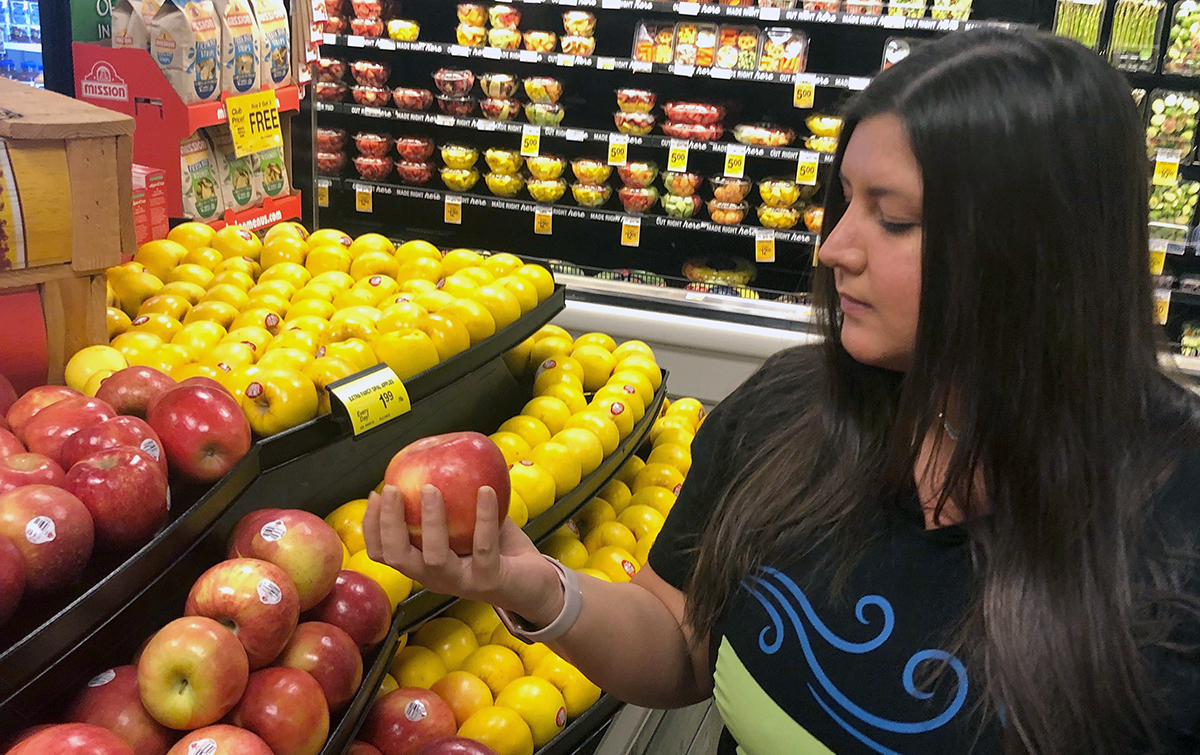Random samples of conventional store-brand foods purchased in 15 states, including Oregon, contained varying levels of three common but controversial pesticides, according to a report from Friends of the Earth.
Rainier apples, dried pinto beans, applesauce, fresh spinach and toasted 0-shaped oat cereals were purchased at Costco, Walmart, Kroger (Fred Meyer) and Safeway-Albertsons stores.
From Oregon, foods purchased at a Costco and Fred Meyer in Eugene were tested.
While lab results showed pesticides in all the samples were within the limits set by the federal government, the report instead compared them to Environmental Working Group benchmarks, which are much lower.
“The food tolerances set by the EPA are not actually protective enough of human health,” said Kendra Klein, senior staff scientist at Friends of the Earth U.S. and author of the report, released Feb. 5. “So they are not a good benchmark if we are concerned about children’s health in particular, or fetal development.”
Environmental Working Group is the nonprofit advocacy organization that publishes the Dirty Dozen guide for shoppers that lists the most-pesticide-ridden produce, which includes apples and spinach.
The food samples were tested for three pesticides that have come under fire in recent years, as studies have shown them to be harmful to human health and the environment.
These chemicals and a sampling of their side effects, according to the report, are:
Glyphosate, the active ingredient in Roundup, has been linked to DNA damage, endocrine (hormone) disruption, non-Hodgkin’s lymphoma and shortened pregnancy. The U.S. allows 3.5 times the level of this residue on food the European Union allows.
Neonicotinoids, some of the most-used pesticides in the world, have been associated with endocrine disruption and negative impacts in developing fetuses and children. Studies indicate they’re contributing to the decline of pollinators such as bees and butterflies. These pesticides are systemic, getting into every part of the plant, and cannot be washed away.
Organophosphates, which were originally developed as a nerve agent, are the most widely used insecticide. A recent peer-reviewed study published in PLOS Medicine found this entire class of chemical causes brain damage in children at low levels. Experts are widely calling for a ban. The EPA did ban one of the commonly used chemicals in this group, chlorpyrifos, but the Trump administration reversed the ban before it took effect.
All three of these pesticides have been banned in at least some European countries, and the latter two have been banned or restricted in some U.S. cities and states.
While the implications of this report are limited – it was not peer reviewed, and samples collected in each state were few – the findings are reason to give shoppers pause.
The lab detected at least one of these pesticides in 100 percent of applesauce and cereal, which can’t be washed, and organophosphates, the insecticides linked to brain damage in children, was were found in 100 percent of the applesauce samples, 32 percent of the spinach samples and 61 percent of the apples.
The average level of glyphosate found in the two cereal samples bought in Oregon – Kroger brand Toasted Oats from Fred Meyer and Cheerios from Costco (the cereal wasn’t available in Costco’s store brand, Kirkland Signature) – was more than three times Environmental Working Group’s benchmark for lifetime cancer risk for children at 500 parts per billion, according to Beyond Toxics, which collected the samples from Eugene.
Beyond Toxics was one of 12 organizations that partnered with Friends of the Earth to collect samples, which were all delivered to Health Research Institute, a nonprofit lab in Iowa that specializes in detecting pesticides, for testing.
The average level of glyphosate found in Oregon pinto beans was almost five times Environmental Working Group’s benchmark, and Oregon stores had the second-highest concentrations of organophosphates in apples, although the apples were grown in Washington.
This was the first time Friends of the Earth tested grocery store samples.
“We have an ongoing campaign that is encouraging the top 25 U.S. food retailers to phase out all toxic pesticides, but focused on these three that we tested,” Klein said. This report is part of that effort “to raise this issue and educate consumers and get people engaged,” she said.
In Oregon, a bill to ban chlorpyrifos and a bill to make neonicotinoids a restricted-use pesticide are expected to be introduced this legislative session.
“We have a suite of pesticide efforts this year that we’re working on,” said Krystal Abrams, from Beyond Toxics.

The Eugene-based nonprofit is also backing bills that would ban aerial herbicide and pesticide spraying on public lands, require advance notice of aerial spraying on all lands, and find funding to update the Oregon Pesticide Use Reporting System.
While another bill to ban neonicotinoids, House Bill 2619, has been introduced, Beyond Toxics’ bill has not. Beyond Toxics is seeking to remove neonicotinoids from the consumer market but not ban their use on farms where licensed applicators who are educated on application safety apply them.
“We don’t want to burden our farmworkers. We want responsible people to use tools that they need to grow food,” Abrams said. “They are just too toxic for the general public. We really have to get them out of our urban areas.”
Kroger did not reply to a request for comment regarding the report’s findings. Costco declined to comment.
Email Senior Staff Reporter Emily Green at emily@streetroots.org. Follow her on Twitter @greenwrites.



